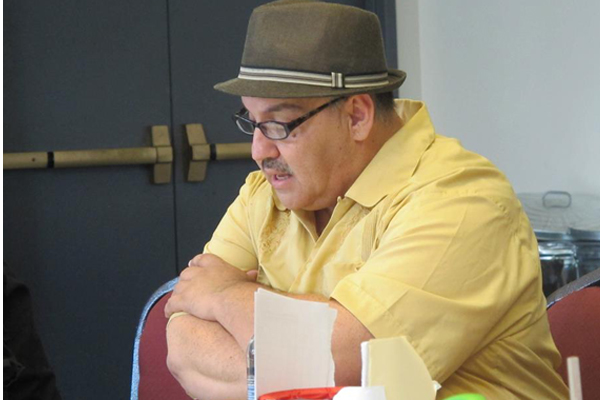
Courtesy of Victory Gardens Theater.
Luis Alfaro at a table read for Mojada.
With Mojada, the playwright Luis Alfaro completes a tragic trilogy he began almost a decade ago. In 2004, the Goodman hosted the premiere of Electricidad—the Electra myth transported to contemporary Los Angeles. Last year, Alfaro's Oedipus El Rey—also set in gang-infested South Central LA—debuted at the Victory Gardens.
For Mojada, Alfaro brings the 2,000-year-old tragedy of Euripides' Medea to Pilsen. We spoke with Alfaro about conceiving the piece, using Pilsen to shape his storytelling, creating characters for specific Chicago actors, and doing dramaturgy on the No. 8 bus.
Chicago: Why move Medea, the story of a scorned woman who sacrifices her children, to contemporary Pilsen? How did the community in that neighborhood inform your text?
Luis Alfaro: I think we go to the theater not to see ourselves, but to see ourselves reflected into the larger world, or to see ourselves reflected in people who maybe don't look like us. I love that something as vast and as timeless as Greek tragedy fits so well into a specific, contemporary neighborhood. There's something very beautiful and extraordinary about listening to a myth that's been around for over a thousand years, and hearing it resonate through a modern setting. I also spent time in Pilsen in the '80s and early '90s, when it could be a really scary place. You had to watch what block you went down. You could always see the Chicago skyline in the distance, but one thing I learned was that there were a lot of people there who were afraid to leave their neighborhood. They never went to the lake. Knowing that helped me create the character of Medea (Sandra Delgado), who is afraid to leave her yard. She's a gifted seamstress but so afraid, she literally can't go beyond this small, insular world she's made for herself.
You tell the story of Medea through the lens of recent immigrants to Chicago, some documented, some not. Why did you decide to wrap the story around that particular issue?
I was watching the debates on immigration taking place in Congress and around the country, when I started thinking that maybe this subject was something that could appeal to today's audiences and that the issue—and the whole notion of exile—might transfer really well in telling the Medea story. There are about 525,000 undocumented people living in Chicago. When you give faces to those people, you get a drama that's not an intellectual exercise. You get something that comes from the heart, not the head. Medea is one of three generations of assimilation going on in Mojada. There is also Josefina (Charin Alvarez) who has been here a while and is making a life for herself and her family with her food cart. And you've got Armida (Sandra Marquez), who has been very successful at establishing a lucrative business and adapting to the point where she's a powerful businesswoman.
I [also] wanted to capture the different levels of assimilation and really provide a picture of what migration is all about.
You wrote these roles with Alvarez, Marquez and Delgado—all actors you've worked with previously—in mind. How did these women shape the characters you created?
Charin brings a beautiful vulnerability to the role of Josefina (King Aegeus in the original). She has a driving need, a want to succeed in this new place. There's also this sense of the eternal optimist in her. This is a character who speaks her heart, names her history. And Charin's voice, her voice is just so beautiful. I love the sound of it. Sandra (Marquez), plays the role of King Creon, who I made into a female character, Armida. She has an authority and a sharpness to her. From the moment she arrives, she's in charge. As Medea, Sandra (Delgado), possesses this emotional complexity that's fascinating. She's physically small, but there's a force and a rage within her that makes things pop. She—Medea—is not a victim.
Is it true that you and director Chay Yew work on dramaturgy every day while riding the 8 bus?
One of the things I've committed to while staying in Chicago is doing transit like everybody does transit. So after every rehearsal, Chay and I take the bus from Victory Gardens back to his apartment, where I'm staying. It's a really important time. It allows us to decompress and really attack what we're working on. Chay is a director, but he's really a writer. He's been published a lot more than I have. He'll clarify for me when I need to translate something or really move the story along. The other day somebody said to us, you should just take a taxi. I was like, no. Absolutely not.
Mojada runs through August 11 at Victory Gardens Theater.


